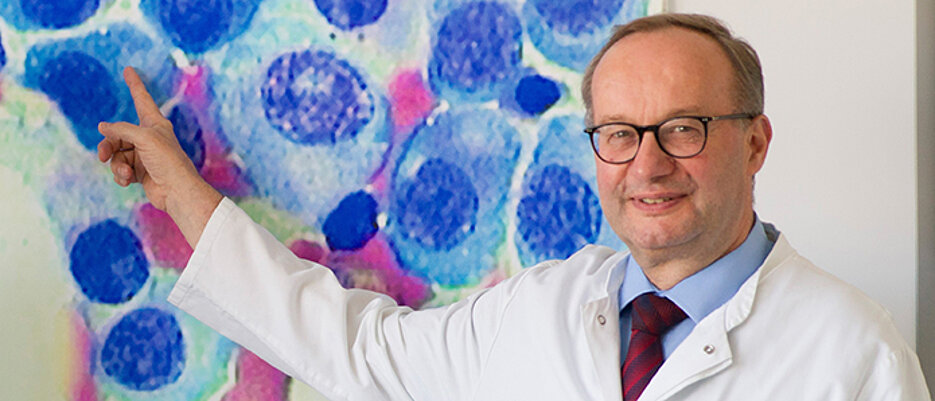Milestone in the treatment of hematological malignancies
06/16/2023CAR-T cell therapies top standard of care therapy in patients with relapsed/refractory multiple myeloma. This has now been shown in an international study in which Professor Hermann Einsele was involved.

Every year, about 7,000 people in Germany are diagnosed with "multiple myeloma", the second most common hematological malignancy (blood cancer). The disease is caused by proliferation of malignant plasma cells, mainly in the bone marrow. Inspite of a lot of novel drugs and treatment strategies – most of the patients with multiple myeloma relapse. One source of hope: immunotherapies with T-cell engaging antibodies or genetically modified T cells, the so-called CAR-T cells. These therapies use and redirect the body's own immune system to recognise and fight the cancer.
A new international study called "CARTITUDE-4" has now proven that CAR-T cell therapies are superior to standard of care for myeloma patients with 1-3 prior lines of therapy. It was codesigned and codeveloped by Professor Hermann Einsele, Director of the Department of Internal Medicine II of the University Hospital Würzburg (UKW) and spokesperson of the newly founded National Centre for Tumour Diseases (NCT) WERA. The results of the work were published in the New England Journal of Medicine and recently assessed as a "milestone in myeloma therapy" at the European Haematology Congress in Frankfurt.
Lower risk of multiple myeloma progression or death
Participants in the study were patients with multiple myeloma who had developed resistance to the drug lenalidomide. "The use of lenalidomide is widespread in myeloma therapy," explains Hermann Einsele. "However, patients with myeloma often develop resistance to it, so that they no longer respond to the treatment." In these cases, the prognosis is extremely poor: the median survival time of those affected is then less than twelve months. "Therefore, there is an urgent need for new therapies that are effective at an early stage."
In the study, patients were randoiized to either CAR-T cell therapy or standard of care therapy. The result: "In a direct comparison with standard treatment, we were now able to show that the Cilta-Cel CAR-T cell therapy leads to significantly lower risk of disease progression or death even with a single infusion," says Einsele. " An overall response rate of 99.6% and a CR rate of > 86% was seen after CAR T cell therapy - a result never observed in patients with multiple myeloma. With the same CAR T cell product (cilta-cel) after six lines of pre-treatment, a disease-free survival of 34.9 months was reported." Thus, these results in patients with less heavy pretreatment suggested that earlier use after one to three pretreatments could open up even significantly longer disease-free survival and even cure options.
About the study design
A total of 419 patients were randomised for the phase 3 trial, 208 people received treatment with Cilta-Cel and 211 received standard therapy. Progression-free survival after twelve months was 75.9% in the Cilta-Cel group and 48.6% in the standard treatment group. More people in the Cilta-Cel group than in the standard treatment group also had an overall response (84.6% versus 67.3%), a complete response or better (73.1% versus 21.8%) and no minimal residual disease (60.6% versus 15.6%). Even more impressive was the analysis of patients who were actually treated with CAR T-cell infusion: The response rate was 99.4 % - that means: only one person out of 176 treated did not respond. 86 % were able to achieve a complete remission and 90 % were still disease-free after twelve months.






